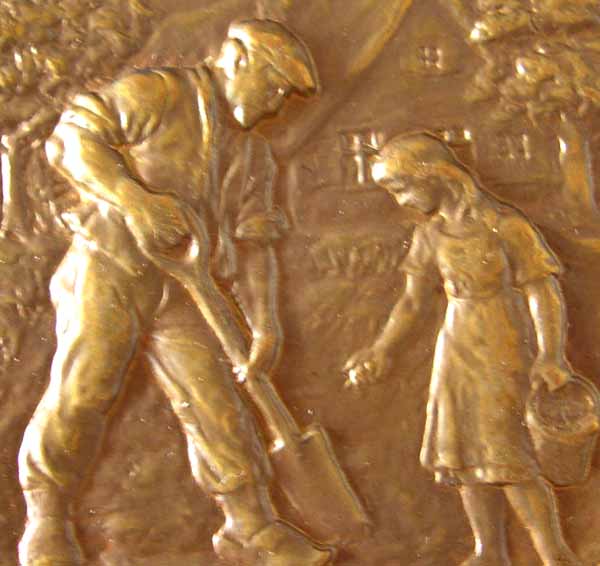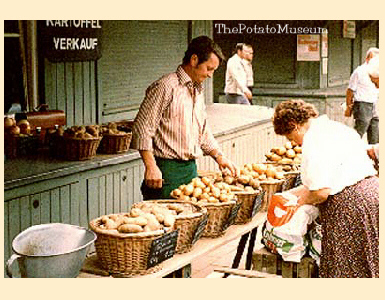Welcome to
The
Potato Museum On-Line
Here you will find features exhibits from our collections,
a blog for spud news/reviews, products, recipes, links and a shop
The
Potato Museum, started (1975) in Brussels, Belgium, is the world's
first museum about the potato and features the planet's largest collection
about this valuable vegetable.
The
Potato Museum is not a product of the potato industry. We are a non-profit
educational organization dedicated to exploring the potato's fascinating
past, controversial present and promising future.
While
we occasionally enjoy eating Belgian fries, as well as chips (crisps
in UK), we mostly consume the noble tuber in many of its more nutritious
and delicious preparations.
We
welcome your comments, suggestions, financial support and ideas for
a permanent home.
"The Potato Museum...that idiosyncratic and
deadly serious institution."
---NY Times
"The Potato Museum is of the new modern type,
which cuts across academic frontiers; it's an enthusiast's museum
and our hard, cold, cynical world desperately needs enthusiasm."
---Kenneth Hudson, author of Museums of Influence
"....a museum that gives sustenance the kind
of attention museums give to wars, airplanes, human tragedy and the
like."
---Christian Science Monitor
"The most important issue confronting the
human race is how we are going to preserve the quality of the environment
and still feed the rapidly growing population into the next millennum.
The Potato Museum provides a vehicle to get the message across."
---Dr. John Niederhauser
1990 World Food Prize Laureate
|
Educator
Resources:
Teaching Potatoes

Suitable for students of all ages, "Planet Potato"
is an interactive 40 minute program that explores the history and social
influence of the world's most important vegetable. Along the way audiences
learn where it comes from, how it grows, ways it is eaten around the
world (other than fried) and how potatoes have transformed the way we
all live.
Using museum artifacts, objects, toys and other props,
Tom Hughes takes a look at how history and social studies have been
influenced through food and how geography has determined what people
eat. He engages students directly, inviting their active participation
in the program, with role-playing, assisting in math and science demonstrations.
( No matter what people eat, it all ends up in the same place, the digestive
system or gut. At the close of each program, using a funny prop, Tom
shows how what we eat really does matter.)
All programs mesh with and support National Education
Standards in Social Studies, History and Geography. They are interdisciplinary,
(selected math and science concepts are included,) multi-cultural and
hands on, with an emphasis on cross curriculum global awareness. The
programs enrich and bolster current school curricula.
STUDENTS WILL:
--Never look at food, especially the potato, the same way again.
--Understand important issues like globalization, using French fries
as example.
--Be active participants in role-playing, math and science demonstrations.
--Understand that their food choices have important consequences.
--Be motivated to lead active, healthy, intellectually engaged lives.
Here are some scenes from the program "Planet Potato"
For more information on booking "Planet Potato"
or any of our other educational outreach programs, please
click here.
Read here
what teachers and parents have to say about our programs.
Our potato
books &
educational materials

The Great Potato Book by Meredith
Sayles Hughes & Tom Hughes, published by Macmillan, NY, 1986. The
history of potatoes illustrated with artifacts and images from The Potato
Museum collections. Chapters include: the living potato; the powerful
potato; the delicious potato; the valuable potato; the well-traveled
potato and the playful potato.

Buried Treasure, by Meredith
Sayles Hughes (Lerner Publications, 1998). Potatoes in space? Super-nutritious
carrots? A 1,500-pound tapioca pudding? This lively book helps students
connect root gardening with history, biology, cultural studies, and
more with intriging historical anecdotes, in-depth views of planting
and harvesting, and detailed diagrams of these important vegetables.
Packed with colorful illustrations and photos.
Potato Power Poster &
"What Can You Teach with a Potato?" Lesson Plans

"Potato Power:
Potatoes Fuel People, Animals & Machines"
Because of its high starch content, the potato is an important
human energy source. This same starch can be converted to ethanol alcohol,
a gasoline substitute which can be used as an alternative fuel. The
Germans used the potato as a fuel source during World War II. Farmers
in Canada have used potato fuels to power their farm equipment.
Lesson plans included on the back of the poster include:
--research project about industrial use of potatoes for alterntive fuels;
--potato vocabulary search;
--potato printing art activity;
--making mashed potatoes and potato chips;
--proving potatoes have starch;
--small container potato growing;
--observating botanical features of a potato.
All
these items and more available at our
shop.
|

EXHIBITS:
Amazing
Potato
Our
Potato Gallery
Potato Hall of Fame
The Literary Potato
Save Our Spuds

POTATO TALK
Our Blog
Total
Tater Experience
Listen
to spud songs while visiting The Potato Museum online.
Here's how:
File>New>Window>
>Potato Radio>select
song>wait for music to start>minimize window>restore www.potatomusum.com
To
listen to more songs, restore Potato Radio window and repeat process.
After
your Potato Museum visit, check out Potato
Engine and other favorite potato links.
Potato
Radio & Potato Engine are creations of
JEFFREY ALLEN PRICE
Why
the potato?
In the space of just
400 years, the potato has become a staple crop of many people around
the world whose antecedents had subsisted perfectly well upon grain
crops for anything up to 4000 years. The reason for this somewhat surprising
development is that the potato is the best all-around bundle of nutrition
known to mankind. Its ration of carbohydrate to protein is such that
anyone eating enough potatoes to satisfy their energy requirements will
automatically obtain most of the protein they require. Furthermore,
the "biological value" of potato protein (an index of the
nitrogen absorbed from a food and retained by the body for growth and
maintenance) is 73, second only to eggs at 96; just ahead of soybeans
at 72, but far superior to corn (maize) at 54 and wheat at 53. Potatoes
also contain significant amounts of essential vitamins (the British,
in fact, used to derive 30% of their vitamin C intake from potatoes.)
Exceptional productivity is another virtue of the potato. A field of
potatoes produces more energy per hectare per day than a field of any
other crop. Potatoes grow well from sea level to 14,000 feet on a wider
variety of soils, under a wider range of climatic conditions, than any
other staple food. The potato matures faster in 90 to 120 days, and
will provide small but edible tubers in just 60 days. All in all, the
potato is about the world's most efficient means of converting plant,
land, water and labour into a palatable and nutritious food.
John Reader, Man
on Earth, 1998
|






